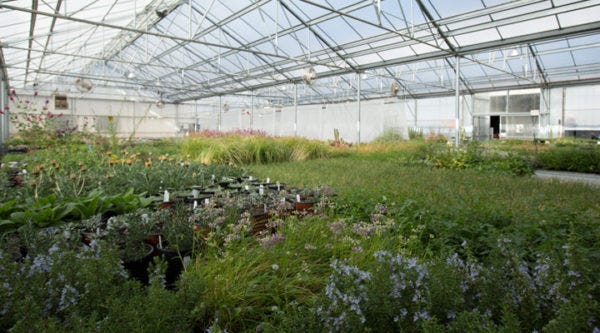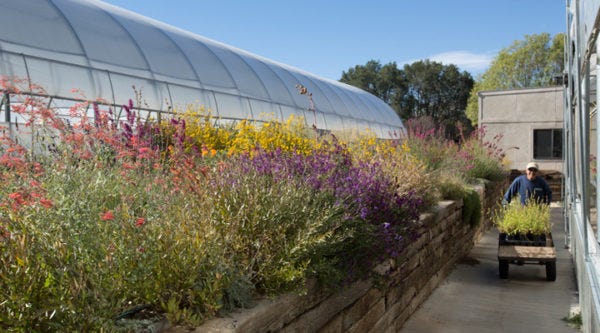by David Salman

Founder and Chief Horticulturist David Salman Weighs In On The "Dumbing Down" Of Horticulture
The "Big Box" stores have become a major force in the marketing and sales of plants across the US. They have transformed the retail plant business over the last 15 to 20 years from an industry traditionally serviced by independently owned nurseries, hardware stores and greenhouses to one that’s dominated by spreadsheets and not horticulturists. They have done so by working with very large wholesale nurseries and gigantic bedding plant growers who are large enough to supply their numerous large stores to drive down prices. This also has the effect of “dumbing down,” or greatly reducing the selection of plant varieties available to choose from.
I went shopping this past weekend at one of our local Santa Fe, NM "Big Box" stores to re-familiarize myself with the current state of industrial plant production and mass marketing as practiced at these types of stores. The experience was illuminating and gave me pause as I put my thoughts together for this blog.

Plant Selection
There is no consistent inventory of most plants, so gardeners can't expect to find much on their "want lists." It's just a matter of luck should you actually find specific plants you're seeking. Generally, the Big Boxes emphasize color and impulse purchases. Their suppliers just ship them what's blooming and what will sell fastest, never mind the fact that those blooms will all wither the minute you plant your new purchase. So don't expect to find any depth of inventory other than the occasional unique variety that finds its way to their shelves. A few things to keep in mind:
- Annuals - This is what they like to sell best. (Think about it – the Big Box likes nothing more than to sell them to you every spring!) But exercise caution because they sell a lot of branded annuals (Proven Winners and others) that may not be good choices for local use.
- Special Use Plants - If you’re looking for natives, xeric varieties or even plants for pollinators, you’ve come to the wrong place! The Big Box business model relies on mass appeal, not special needs.
- Regionally unsuitable plants - This is a very common problem at the Big Boxes. Because inventory decisions are made based on national sales data, often by someone sitting at "Corporate Headquarters," you'll often find numerous plants are unsuited to your soil and climate. For example, I was bemused to find a big selection of Azalea plants which are not even remotely growable in Santa Fe. Beware of these out-of-zone offerings, for instance, you’ll often find numerous non-cold hardy plants for sale that will not make it through the winter. Check the tags for cold hardiness!
- Employee Expertise and Plant Knowledge – In my experience, I’ve found the garden section workers well-intentioned but grossly untrained in comparison to a local nursery employee. So, don't go counting on knowledgeable, experienced horticulturists to be on staff to answer your gardening questions and make educated recommendations.
- Hardgoods - The Big Box stores are smart and know that in the spring, plants bring people in the door. They therefore often use their garden centers as “loss leaders” – departments or products that they don’t need to make money on. They then work hand-in-glove with the big chemical and hardgood companies to sell as many profitable, complementary products as possible. Take the big fertilizer and pest-control companies, as an example. Their products, such as Weed-n-Feed lawn fertilizers, Round-Up, grub killer, pre-emergent herbicides and other garden chemicals, are designed to simply make you and your lawn and garden more reliant upon the same chemicals, month after month, year after year. For those who want to feel better about their choices, these giant chemical companies often make ‘organic’ versions of their products, but I personally struggle to trust these related products.

What is a Well-Intentioned Gardener to Do?
The solution is simple: Do your homework and make the bulk of your plant purchases from reputable locally-owned greenhouses, garden centers and specialty catalog/on-line retailers. If you expect to have access to accurate horticultural information, regionally appropriate plants and quality organic/natural gardening products, you need to support these non-Big Box vendors. Otherwise who is going to grow the unusual plants and afford to have experienced, educated horticulturists on staff? Who is going to ensure that our vast palate of biologically diverse plants is not simplified down to those that make the most money? I always caution folks that "if all you buy is fast food, don't be surprised when there are no farm-to-table restaurants when you want access to healthy meals." The same holds true for plants.
Text by Founder and Chief Horticulturist David Salman.
© All articles are copyrighted by High Country Gardens. Republishing an entire High Country Gardens blog post or article is prohibited without written permission. Please feel free to share a short excerpt with a link back to the article on social media websites, such as Facebook and Pinterest.